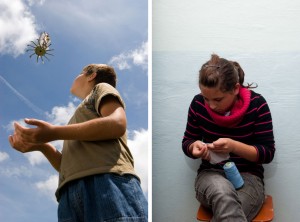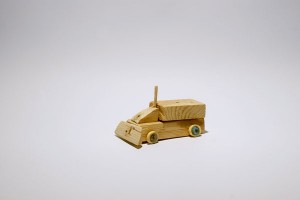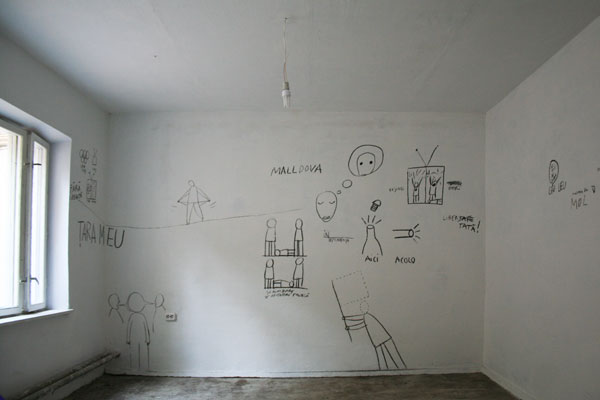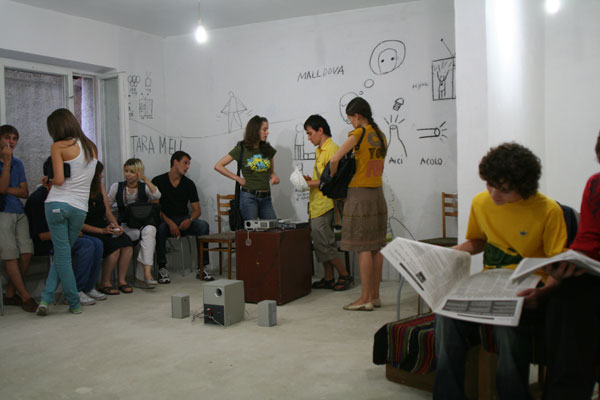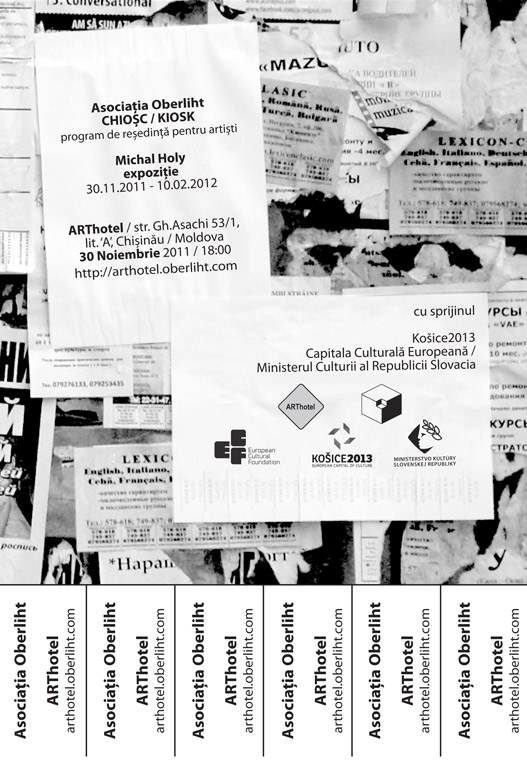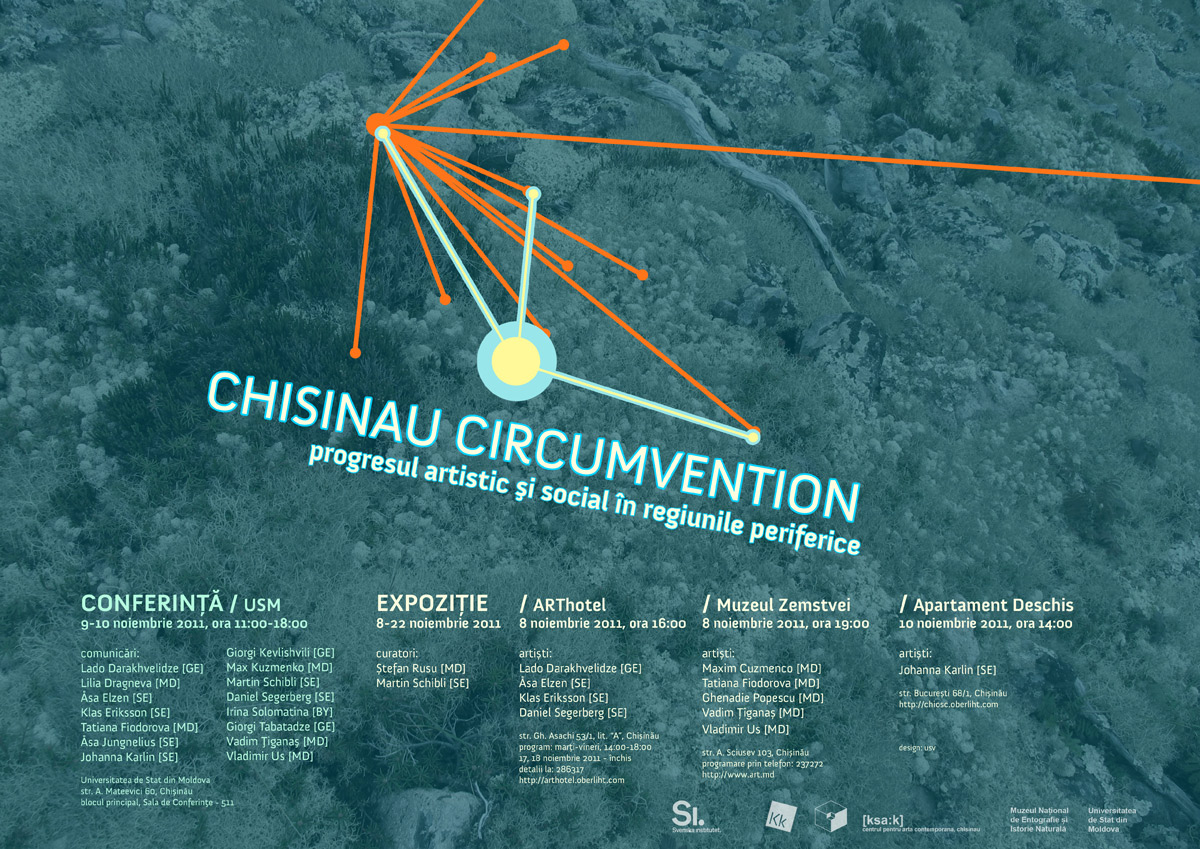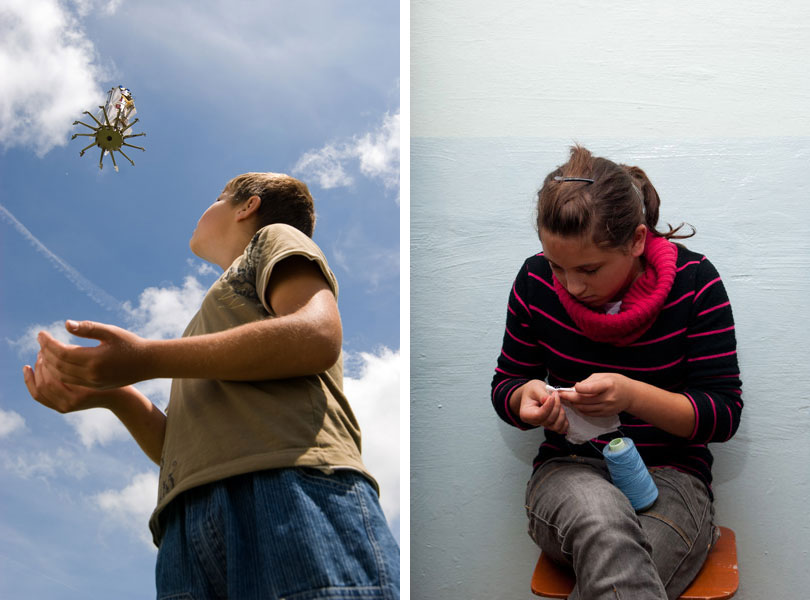POPOV Serhiy [UA] – expoziție de fotografie / photo exhibition
RO
– – – – –
CHIOŞC – program de reşedință pentru artişti şi curatori
Serghei POPOV
CREAȚIA COPIILOR – expoziție de fotografie
curator: Vladimir US
vernisaj: Joi, 23 decembrie, 2010, ora 16:00
perioada: 23 decembrie, 2010 – 25 februarie, 2011
expoziția poate fi vizitată prin programare la tel: + (373 22) 286317, de marți pînă vineri între orele 14:00-18:00
Creația copiilor
La granița dintre secole, la limita unor rupturi sociale, în timpurile schimbărilor și accelerării, ne mai ciocnim cu atribute culturale și structuri caracteristice majorității statelor din spațiul postsovietic. Acumulînd o experiența de conlocuire de lungă durată acestea s-au ales cu același sistem de instituții culturale, care mai continuă să existe pînă în prezent. Casele de creație a copiilor și adolescenților fac parte din acest sistem.
Create pentru prima dată la începutul secolului trecut, casele „pionerilor” s-au răspândit pe teritoriul tuturor republicilor sovietice, oferind o structură ierarhică și o metodologie proprie de instruire în domeniul culturii. După căderea regimului aceste „palate” au trecut într-un regim autonom de gestionare la nivel raional, atât din punct de vedere financiar cât și în plan cultural. În lipsă de fonduri, făcînd excepție casele pionerești din orașele mari, acestea au degradat rapid, inclusiv în plan cultural, împreună cu planurile și metodologia de instruire clonate încă din timpurile sovietice doar în calitate de o dare de seamă. Schimbări calitative nu s-au produs și nici nu pot avea loc din pricina mai multor circumstanțe. Actualitatea problemei nu este iluminată, nu i se acordă o importanță cuvenită, lipsește comprehensiunea.
Serhiy POPOV
- – -
Intre 16-25 octombrie 2010, Serhiy POPOV a luat parte la programul de resedinta pentru curatori si artisti, organizat in cadrul proiectului CHIOSC – punct de informare cultural / platforma publica de participare, o resedinta care a avut drept obiectiv al cercetarii situatia lacaselor culturale si a caselor de creatie pentru copii (fostele case pioneresti) din Moldova si functiei lor publice. Aceasta investigatie de scurta durata s-a materializat intr-o serie de vizite la casele de cultura din Cimislia si Straseni si ulterior in realizarea unei serii de fotografii.
Proiectul in sine s-a structurat in mai multe etape, printre care documentarea situatiei in care se regasesc astazi spatiile ce apartin caselor de cultura si de creatie pentru copii, documentarea lucrului copiilor, a tehnologiilor utilizate de acestia si, in final, a produsului artistic pe care ei il realizeaza in conditiile mostenite de la vechiul sistem.
Dincolo de rolul ideologic pe care aceste lacase il jucau in timpurile Uniunii Sovietice, casele pioneresti aveau menirea sa ofere un program de instruire tehnologica pentru baieti si fete accesibil pentru marea parte a populatiei, ceea ce suplinea lipsa unor programe educative in special in zonele rurale ale Moldovei. Dupa 1991, trecute la balanta primariilor, in contextul unei crize economice si sociale fara precedent ce marcheaza pina in prezent situatia de tranzitie in care ne aflam, “palatele” pioneresti, alaturi de casele de cultura, au cunoscut o degradare cumplita, multe din ele fiind disfiintate ca si locatii, iar altele fiind lasate in voia sortii fara ca programele si metodologiile de instruire ale acestora sa cunoasca o modernizare post-sovietica de orice fel.
Acelor case de creatie care au reusit sa-si mentina programele active le este caracteristic pina in prezent utilizarea lucrului manual precum si o divizare a preocupatiilor artistice aparte pentru fete si baieti, primele fiind instruite sa coasa si sa tese, ca si o preocupare milenara, iar baietii experimentind mai mult in plan tehnic si realizind diverse constructii mecanice. Noile tehnologii reprezentate prin calculatoarele importate prin unele programe de granturi, constituie unicul indiciu al modernizarii caselor de creatie pentru copii.
In plan general se constata o lipsa a unei strategii de ‘reinviere’ a acestor institutii educationale (odata deconectate de la sistemul centralizat care le oferea un suport metodo/ideologic), fapt care ar putea duce la disparitia totala a acestor focare de instruire daca o alternativa va intirzia sa apara.
Vladimir US
- – -
Serhiy POPOV CV
Născut în Komsomolsk în 1978.
Lucrează și locuiește în Kharkov, Ucraina. Activitatea creativă și-a început-o în anii 2000. Abordând problemele sociale curente, continuă tradiția fotografilor care lucrau în anii ’70 și ’90. În 2005 se alătură grupului “SOSka”. Lucrarea ”Grădina” din 2008 determină direcția anilor curenți. Mai recent el explorează școli și instituții preșcolare ce operează în contexte socio-culturale specifice. Centrele de creație pentru copii și și fostele centre culturale sovietice (”cluburile”) sunt instituțiile care reprezint dogma culturală din prezent în forma ei primară. Autor de proiecte fotografice, picturi, video.
EN
– – – – -
CHIOSC – artist & curator in residency program
Serhiy POPOV
CHILDREN’s CREATIVITY – photo exhibition
curator: Vladimir US
opening: Thursday, December 23, 2010, 4 pm
period: December 23, 2010 – February 25, 2011
the exhibition can be visited by calling us in advance on this phone number: + (373 22) 286317, from Tuesday to Friday, from 2 pm to 6 pm.
Children’s creativity
In between the centuries and on the edge of major changes the post-soviet space is still characterized by similar cultural structures and signs. Former Soviet Socialist Republics, after a long period of being together, have inherited a network of cultural institutions among which there are the houses children’s and youth creativity – so called “Pioneers’ Palaces”. Starting with the beginning of the last century, when they were first founded, the Pioneers’ houses were established in all Soviet republics later on, with its own hierarchy, system of values and methodology of cultural education. After the fall of the regime followed up by the disintegration of the Union, these ‘palaces’ were given away to the local administration to take care off both financially and culturally. Due to the lack of money needed to support their activity these institutions, making exception few from bigger cities, are missing the perspective of their cultural development, taking as a base the education methodology existing before 1991. Unfortunately, there is no chance for qualitative changes to take place due to many reasons and the importance of this particular problem is lacking visibility, attention and understanding.
Serhiy POPOV
- – -
Between 16-25th of October 2010, Serhiy POPOV took part in the artist in residency program organized in the frame of CHIOC project – cultural info-point and public platform for participation. The main objective of the residency was to perform a research about the current situation registered by the houses of culture and children’s and youth creativity (former Pioneers’ houses) and about their public function. This short-term investigation has materialized in a series of photographs realized during few visits undertaken to the houses of culture from Cimislia and Straseni.
The project was structured in several stages among which were the documentation of the current situation and spaces belonging to the houses of culture and youth creativity, documentation of children at work, of the used technology and of the artistic works that are being produced in these inherited from the soviet system conditions.
Beyond the ideological role played by these institutions in soviet times the Pioneer’s houses were offering a technological education to boys and girls, accessible to the major part of the population, with the intention to supply the missing education programs especially in the rural parts of Moldova. After 1991, being handed over to local authorities, in the context of a major social and economic crisis characteristic for the whole period of transition, which we are going through, the Pioneer’s ‘palaces’, along with the houses of culture had started falling into decay. Many institutions were closed and their location was changed, others were left on their own with no support of any kind for their modernization and of the education methodology used by them.
Those houses of youth creativity that have succeeded to keep running their programs till present moment are characterized by manual work as well as a clear division of artistic tasks between girls and boys, girls being taught to sew and weave, as a millenary activity, and boys experimenting with different mechanic construction and improving their technical skills. The new technologies embedded in the imported computers as a result of different granting programs represent the only sign of modernization of houses of children’s and youth creativity.
Speaking generally a strategic vision for the reenactment of these institutions is lacking. Once being disconnected from the centralized system that was offering them the methodo/ideologic support these houses risk to disappear totally if an alternative to replace these institutions will not be offered soon.
Vladimir US
- – -
Serhiy POPOV CV
Born in Komsomolsk 1978.
Works and lives in Kharkov, Ukraine. Creative activity began in the early 2000’s. Addressing the problems of the current social situation, he continue the tradition of photographers whose work in the 70’s and 90’s identified key social issues. In 2005 he joined the group “SOSka”. Work “The Garden” (2008) determined the direction of recent years. More recently he started to explore primary education and preschool institutions operating in specific sociocultural context. House of children’s art and former Soviet Union’s cultural centers (so called “clubs”) are the institutions which represent official cultural dogma in its primary form. Author of photo projects, paintings and videos.
« Reciclarea sticlelor de plastic la ARThotel / recycling plastic bottles

